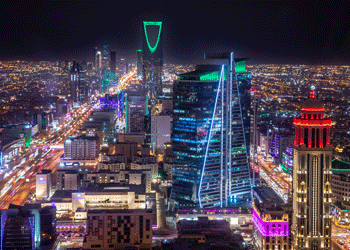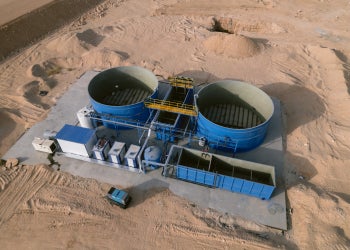The way forward for the region’s energy transition
12 December 2022
Published in partnership with

Whichever way one looks at it, the world faces a climate emergency. In its most recent multi-agency report published in September, the World Meteorological Organisation (WMO) warns that there is an almost one in two chance that the annual mean temperature in at least one of the next five years will be 1.5°C higher than the 1850-1900 pre-industrial average.
This figure is important because it would breach the maximum temperature rise set by countries under the terms of the 2015 Paris Agreement and underlines the lack of progress in reducing harmful emissions.
“Floods, droughts, heatwaves, extreme storms and wildfires are going from bad to worse, breaking records with alarming frequency,” said UN secretary-general Antonio Guterres in the report.
“Heatwaves in Europe. Colossal floods in Pakistan. Prolonged and severe droughts in China, the Horn of Africa and the United States. There is nothing natural about the new scale of these disasters. They are the price of humanity’s fossil fuel addiction.”
There are multiple ways to reduce global greenhouse gas emissions, with a common thread among them being using technology as a solution.
Whether by making gas turbines more efficient, producing new low-carbon or carbon-free fuels such as hydrogen, increasing renewable energy output, or ensuring homes, towns and cities are ‘smarter’ in their use of electricity, technological innovation presents a means for countries to lower their carbon outputs.
All [the reports] stressed we are not on track to keep climate change below 2 degrees, or even keep the 1.5 degree target within reach. More work needs to be done
Mohamed Nasr, Egypt's lead negotiator at Cop27
Scale of the problem
In the series of six articles MEED has published in association with Siemens Energy, we have explored the chief challenges the Middle East and Africa regions are facing in the fight against global warming and some of the opportunities and potential solutions to overcome them.
The first hurdle is recognising the scale of the climate challenge. The Siemens Energy Middle East & Africa Energy Week in June highlighted the disconnect between the perception of progress and reality, even among industry professionals.
When asked to quantify CO2 reductions in their country today and what they will be in 2030 compared to 2005, Energy Week participants estimated that total emissions had fallen by 23 per cent on average over the past 17 years. Only one-third correctly answered that emissions had not only failed to fall, but had actually risen by 50 per cent over the same period.
“All [of the reports] stressed that we are not on track to keep climate change below 2 degrees, or even keep the 1.5 degrees target within reach. More work needs to be done,” emphasised Mohamed Nasr, director of the Environment & Sustainable Development Department at Egypt’s Foreign Affairs Ministry and lead negotiator for Egypt at Cop27 during the event.
The harsh reality of the situation has underscored the pressing need for more rapid action among countries in the region. For the wealthier oil-exporting nations of the Middle East, much of the emphasis over the past 18 months has been placed on developing a green hydrogen industry to produce cleaner fuels. This is reflected by the more than 50 new green hydrogen projects announced in the GCC and North Africa over the past 18 months, which have an estimated investment value of more than $150bn.
On the other hand, the priority for many countries in sub-Saharan Africa is very different as they battle the energy trilemma of extending affordable and reliable electricity provision to their populations. Spending billions of dollars on greenfield hydrogen developments and their associated infrastructure is not an option for many. Instead, the focus has generally been on smaller, off-grid renewable energy capacity to resolve the trilemma.
 Working in tandem
Working in tandem
Regardless of the approach adopted, the private sector recognises that companies need to work more collaboratively in the drive toward net zero. A case in point is the newly formed Alliance for Industry Decarbonization.
Announced in early September by the International Renewable Energy Agency (IRENA) and Siemens Energy, the alliance has already grown nearly threefold from the original 13 international energy and industrial members.
The new industry grouping aims to achieve country-specific net-zero goals faster by encouraging action to decarbonise industrial value chains and enhance the understanding of renewables-based solutions and their adoption by industry.
The alliance met for the first time at Cop27, where its members played a prominent role in discussions and thought leadership. Ultimately governments recognise that without corporates worldwide investing in clean energy projects and technology, there is little hope that targets will be achieved.
The intergovernmental summit ended on 20 November with a historic accord on setting up a fund to help compensate poorer nations for the economic and social destruction caused by climate change.
But while the agreement, a culmination of some 30 years of negotiations between developed economies and developing nations, was a major step in the right direction, there remains a lot more that needs to be done to avoid an environmental catastrophe, such as setting legally-binding emission reduction targets, for example.
The good news is that technologies and know-how are increasingly available to solve many of these challenges.
What is now needed is the political will and collaboration among nations and companies to work together to overcome our greatest threat.
In the words of Siemens Energy president and CEO Christian Bruch: “The energy transition is the biggest investment programme since the dawn of industrialisation. If governments, business and society work together, energy transition is a massive opportunity. There is no excuse for waiting any longer.”
Related reads:
- Working towards a common energy-transition goal
- New alliance forged to accelerate net-zero ambitions
- The journey towards net zero
- Solving Europe’s energy challenge
- Delivering the reality of the green dream
- Africa’s energy trilemma
- Region primed for global green hydrogen leadership
Exclusive from Meed
-
 Solar deals signal Saudi Arabia’s energy ambitions
Solar deals signal Saudi Arabia’s energy ambitions13 February 2026
-
 Saudi Arabia appoints new investment minister
Saudi Arabia appoints new investment minister13 February 2026
-
 Indian firm wins major Oman substation contract
Indian firm wins major Oman substation contract12 February 2026
-
 Developers appoint contractor for $500m wastewater treatment project
Developers appoint contractor for $500m wastewater treatment project12 February 2026
-
 Dewa raises Empower stake in $1.41bn deal
Dewa raises Empower stake in $1.41bn deal12 February 2026
All of this is only 1% of what MEED.com has to offer
Subscribe now and unlock all the 153,671 articles on MEED.com
- All the latest news, data, and market intelligence across MENA at your fingerprints
- First-hand updates and inside information on projects, clients and competitors that matter to you
- 20 years' archive of information, data, and news for you to access at your convenience
- Strategize to succeed and minimise risks with timely analysis of current and future market trends

Related Articles
-
 Solar deals signal Saudi Arabia’s energy ambitions
Solar deals signal Saudi Arabia’s energy ambitions13 February 2026
 Commentary
Commentary
Mark Dowdall
Power & water editorSaudi Arabia’s recent agreement to build $2bn-worth of solar power plants in Turkiye is the latest sign that the kingdom’s energy influence is changing.
Historically, this was measured in oil barrels and export volumes. Increasingly, this is extending to capital, structuring expertise and the ability to deliver record-low tariffs in competitive markets.
Announcing the deal, Turkish Energy Minister Alparslan Bayraktar said tariffs for the plants would be the country’s lowest on record, with electricity purchased under 25-year power purchase agreements.
It followed another announcement, in January, that Acwa is investing $200m to build a large-scale solar photovoltaic (PV) plant in the Philippines.
Whether Saudi-backed companies ultimately retain long-term stakes or primarily develop and build the assets, their role at the front end is significant.
Sponsors that bring sovereign backing, clear procurement processes and access to low-cost financing can influence tariffs and contract terms from the outset.
There is also a geopolitical layer. Investing in Turkiye, or anywhere for that matter, strengthens political and economic ties at a time when regional alignments are shifting.
Energy infrastructure is also long-term by its nature. It connects ministries, regulators, lenders and operators in relationships that often extend well beyond a single transaction.
Saudi Arabia has spent the past few years refining its approach to pricing, structuring and financing large-scale renewables at home.
Exporting that expertise may not rival oil in scale or visibility, but it does signal that Saudi Arabia is becoming more than just an energy supplier.
Increasingly, it is becoming a participant in how other countries design and finance their energy transitions. That influence is still significant.
https://image.digitalinsightresearch.in/uploads/NewsArticle/15645903/main.jpg -
 Saudi Arabia appoints new investment minister
Saudi Arabia appoints new investment minister13 February 2026
Register for MEED’s 14-day trial access
King Salman Bin Abdulaziz Al-Saud has made a series of senior government changes, including Khalid Al-Falih leaving his role as investment minister to become minister of state and a member of the cabinet.
Al-Falih has been replaced by Fahad Al-Saif as investment minister. Al-Saif has been head of the Investment Strategy and Economic Insights Division at the Public Investment Fund (PIF) since 2024. That role involved formulating PIF’s long-term investment strategy. He has also served as head of the Global Capital Finance Division, a role he has held since joining PIF in 2021.
The change of investment minister comes at a time when securing investments has become a key priority for Saudi Arabia as it prepares to hand over more projects to the private sector for delivery.
King Salman also named Abdullah Al-Maghlouth as vice-minister of media and Abdulmohsen Al-Mazyad as vice-minister of tourism. Khalid Al-Yousef was named attorney general, and Sheikh Ali Al-Ahaideb will serve as president of the Board of Grievances.
Faihan Al-Sahli was selected as director general of the General Directorate of Investigation, while Abdulaziz Al-Arifi was chosen to lead the National Development Fund. Haytham Al-Ohali will head the Communications, Space and Technology Commission, and Fawaz Al-Sahli will chair the Transport General Authority.
https://image.digitalinsightresearch.in/uploads/NewsArticle/15645415/main.gif -
 Indian firm wins major Oman substation contract
Indian firm wins major Oman substation contract12 February 2026

India’s Larsen & Toubro has won a contract to build the Majan 400/220/132kV grid station in Oman.
Estimated to cost $100m, the project includes an associated 400kV line-in line-out underground cable from Sohar Free Zone to the Sohar Interconnector Station.
The contract was awarded by Oman Electricity Transmission Company (OETC), part of the government-owned Nama Group.
The grid station will comprise eight 400kV gas-insulated switchgear (GIS) bays, eight 220kV GIS bays and 10 132kV GIS bays at the new Sohar Free Zone substation.
The scope includes the installation of two 500MVA, 400/220kV transformers and two 500MVA, 220/132kV transformers.
Local firm Monenco Consulting Engineers was appointed in April last year to provide design and supervision services for the project.
As MEED exclusively revealed, the main contract was tendered in June, as part of three significant contracts to build new substations in the sultanate.
The second contract, worth about $35m, covers the construction of the Sultan Haitham City 132/33kV grid station and associated 132kV line-in line-out underground cables running 4 kilometres from Mabella to Mabella Industrial Zone.
The third contract, valued at about $100m, covers the construction of the Surab 400/33kV grid station and an associated 400kV line-in line-out cable from the Duqm grid station to the Mahout grid station.
Local firms Muscat Engineering Consulting and Hamed Engineering Services are consultants for the Sultan Haitham City and Surab projects, respectively.
The two remaining contracts are currently under bid evaluation, with awards expected this quarter.
https://image.digitalinsightresearch.in/uploads/NewsArticle/15638107/main.jpg -
 Developers appoint contractor for $500m wastewater treatment project
Developers appoint contractor for $500m wastewater treatment project12 February 2026

Register for MEED’s 14-day trial access
Egypt’s Orascom Construction has won the engineering, procurement and construction (EPC) contract for a major wastewater treatment project in Saudi Arabia’s Eastern Province.
A consortium of Saudi utilities provider Marafiq, the regional business of France’s Veolia and Bahrain/Saudi Arabia-based Lamar Holding is developing the $500m (SR1.875bn) industrial wastewater treatment plant (IWWTP) in Jubail Industrial City 2.
Sources close to the project confirmed the appointment to MEED, adding that the project has now entered the construction phase.
Industry sources also said that financial close on the project is expected to be reached in the coming days.
In September, the developer consortium was awarded a contract, under a 30-year concession agreement, by Saudi Aramco Total Refining & Petrochemical Company (Satorp), a joint venture of Saudi Aramco and France’s TotalEnergies.
The planned facility will treat and recycle wastewater from Satorp’s under-construction Amiral chemical derivatives complex, also in Jubail.
Marafiq, formally Power & Water Utility Company for Jubail and Yanbu, will own a 40% stake in the dedicated project company. Veolia Middle East SAS will hold a 35% stake, and Lamar Holding’s Lamar Arabia for Energy will hold the other 25%.
The planned IWWTP, which will primarily serve the $11bn sprawling Amiral chemicals zone, will implement advanced water treatment and recovery technologies to process complex industrial effluents, including spent caustic streams. Treated water will be reintegrated into the industrial processes, supporting closed-loop reuse and energy efficiency.
The project follows a concession-style model, akin to a public-private partnership (PPP), where the developer consortium invests in, builds and operates the wastewater plant over a 30-year period, with returns linked to service delivery.
Marafiq has been involved in several similar projects across Saudi Arabia, including as the sole owner of the Jubail industrial water treatment plant (IWTP8), which treats complex industrial effluents for petrochemical and heavy industrial companies.
In 2020, Saudi Services for Electro Mechanic Works was awarded the $202m main contract for the fourth expansion phase of IWTP8. Construction works on the project are expected to be completed by the end of the quarter.
 READ THE FEBRUARY 2026 MEED BUSINESS REVIEW – click here to view PDF
READ THE FEBRUARY 2026 MEED BUSINESS REVIEW – click here to view PDFSpending on oil and gas production surges; Doha’s efforts support extraordinary growth in 2026; Water sector regains momentum in 2025.
Distributed to senior decision-makers in the region and around the world, the February 2026 edition of MEED Business Review includes:
> AGENDA: Mena upstream spending set to soar> INDUSTRY REPORT: MEED's GCC water developer ranking> INDUSTRY REPORT: Pipeline boom lifts Mena water awards> MARKET FOCUS: Qatar’s strategy falls into place> CURRENT AFFAIRS: Iran protests elevate regional uncertainty> CONTRACT AWARDS: Contract awards decline in 2025> LEADERSHIP: Tomorrow’s communities must heal us, not just house us> INTERVIEW: AtkinsRealis on building faster> LEADERSHIP: Energy security starts with rethinking wasteTo see previous issues of MEED Business Review, please click herehttps://image.digitalinsightresearch.in/uploads/NewsArticle/15637523/main.jpg -
 Dewa raises Empower stake in $1.41bn deal
Dewa raises Empower stake in $1.41bn deal12 February 2026
Dubai Electricity & Water Authority (Dewa) has announced it has increased its stake in Emirates Central Cooling Systems Corporation (Empower) from 56% to 80%.
The transaction was completed through the purchase of 2.4 billion shares and the transfer of the entire ownership of Emirates Power Investment (EPI), which is wholly owned by Dubai Holding.
The total value of the deal is AED5.184bn ($1.41bn).
Empower currently holds over 80% of Dubai’s district cooling market and operates 88 district cooling plants across the emirate.
According to MEED Projects, the UAE’s district cooling sector currently has nine projects worth $1.29bn in the pre-execution phase.
Empower has ownership in four of these projects, which have a combined value of $472m.
This includes a $200 million district cooling plant at Dubai Science Park, with a total capacity of 47,000 refrigeration tonnes serving 80 buildings.
Empower signed a contract to design the plant last August, with construction scheduled to begin by the end of the first quarter of 2026.
The utility is also building a district cooling plant at Dubai Internet City.
UAE-based TMF Euro Foundations was recently appointed as the enabling and piling subcontractor for the project.
https://image.digitalinsightresearch.in/uploads/NewsArticle/15635949/main.jpg


